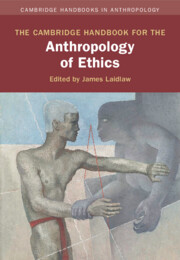Book contents
- The Cambridge Handbook for the Anthropology of Ethics
- Cambridge Handbooks in Anthropology
- The Cambridge Handbook for the Anthropology of Ethics
- Copyright page
- Contents
- Contributors
- 1 Introduction
- Part I Intellectual Sources and Disciplinary Engagements
- Part II Aspects of Ethical Agency
- 9 Making the Ethical in Social Interaction
- 10 Freedom
- 11 Responsibility
- 12 Emotion and Affect
- 13 Happiness and Well-Being
- 14 Suffering and Sympathy
- 15 Ambiguity and Difference
- Part III Media and Modes of Ethical Practice
- Part IV Intimate and Everyday Life
- Part V Institutional Life
- Index
- References
9 - Making the Ethical in Social Interaction
from Part II - Aspects of Ethical Agency
Published online by Cambridge University Press: 11 May 2023
- The Cambridge Handbook for the Anthropology of Ethics
- Cambridge Handbooks in Anthropology
- The Cambridge Handbook for the Anthropology of Ethics
- Copyright page
- Contents
- Contributors
- 1 Introduction
- Part I Intellectual Sources and Disciplinary Engagements
- Part II Aspects of Ethical Agency
- 9 Making the Ethical in Social Interaction
- 10 Freedom
- 11 Responsibility
- 12 Emotion and Affect
- 13 Happiness and Well-Being
- 14 Suffering and Sympathy
- 15 Ambiguity and Difference
- Part III Media and Modes of Ethical Practice
- Part IV Intimate and Everyday Life
- Part V Institutional Life
- Index
- References
Summary
The ‘ethical turn’ in anthropology has charted alternatives to some prevailing philosophical, psychological, and anthropological approaches. This engagement forces anthropologists to reconsider old antinomies such as constraint and agency, relativism and universalism, individualism and collectivism. Like other anthropologists of ethics, we resist forms of determinism that would reduce ethical life to the putatively universal constraints of biology and psychology, the logic of rationality, or the workings of power and ideology. Instead, we consider the processes through which what seem to be constraints or universals serve as affordances that are ethicalized through historically contingent reflexive practices. Rather than being forced to choose between the individual and the collective in terms of who (or what) the ethical subject is, we demonstrate how social interaction is a critical site in which and through which such ethicalization occurs.
Keywords
- Type
- Chapter
- Information
- The Cambridge Handbook for the Anthropology of Ethics , pp. 231 - 250Publisher: Cambridge University PressPrint publication year: 2023

